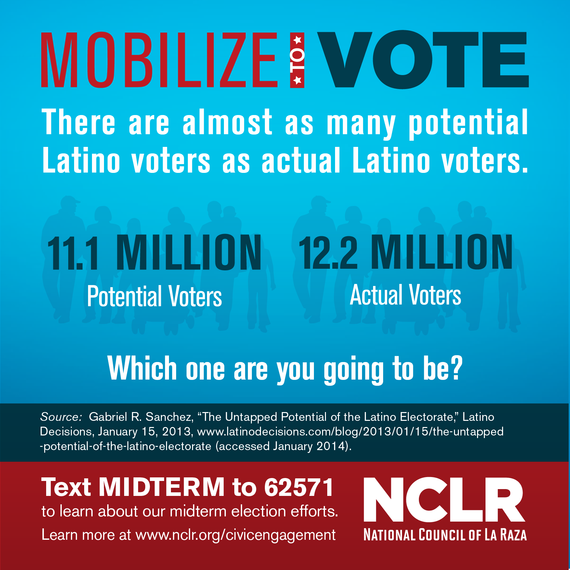
By Loren McArthur, Deputy Director of Civic Engagement, NCLR
The 2012 elections were a powerful demonstration of the growing electoral influence of Latinos. Hispanic voters comprised 10 percent of the total vote -- making them a decisive factor in electoral outcomes across the nation and helping to create a mandate for congressional action on immigration reform. While it is commonly presumed that Hispanic voters will be less influential in the midterm elections, close examination reveals that the Latino vote could have significant impact on congressional and gubernatorial races in 2014. An analysis by Latino Decisions suggests that Hispanic voters could determine the outcome of as many as 33 narrowly contested House seats, including 14 held by Republicans and 19 held by Democrats. The Hispanic vote also has potential to be highly influential in a number of tightly contested gubernatorial races, including the swing states of Florida and Pennsylvania, with potential implications for the 2016 presidential race.
Latinos have had an indelible impact on the U.S. political landscape in recent elections, and they have untapped potential to exert even greater influence. Currently, 8.6 million Latinos are eligible to register to vote, but are not registered. When factoring in registered Hispanic voters who did not vote in 2012, the possible impact nearly doubles: There are almost as many potential Latino voters (11.1 million) as there are actual Latino voters (12.2 million). And the numbers will continue to grow. In the next 15 years, about 900,000 Hispanic U.S. citizens will turn 18 each year, yielding a total of more than 13.5 million potential new Hispanic voters.
Fully leveraging Hispanic electoral potential will require a sustained commitment to registering, educating, and mobilizing Latino voters. Since 2006, NCLR, its subsidiaries, and community partners have registered nearly 500,000 new Hispanic voters, and NCLR is doubling down on registration efforts in 2014. This week, NCLR and Mi Familia Vota announced the launch of their combined nonpartisan voter registration initiative, "Mobilize to Vote 2014." The ambitious campaign, unprecedented in its scale for a midterm election year, aims to register 250,000 new Hispanic voters in 2014.
The stakes are high for the Hispanic community. At the federal level, the prospect of strong Hispanic electoral participation will be a spur to Congress to finish the business of immigration reform, as well as to address Latino priorities in the areas of housing, economic policy, and education, among other issues. The nation's 36 gubernatorial races and state legislative elections will affect a host of state policy issues, including health reform implementation, voting rights, and state budget fights. State elections will also begin to shape the landscape for the 2020 redistricting process, with longer-term implications for Hispanic political representation in Congress. Strong Latino turnout in 2014 is essential to holding leaders at all levels of government accountable to the issues that concern Hispanics and continuing to increase the political voice of the community.
Increasing Latino electoral participation is important not only for Hispanic Americans -- it is good for the country as whole. By 2050, one in three American workers and taxpayers will be Latino; ensuring their integration into the political process, as well as their long-term success and wellbeing, is vital to the health of our democracy and the future prosperity of the nation.
This was first posted to the NCLR Blog.

